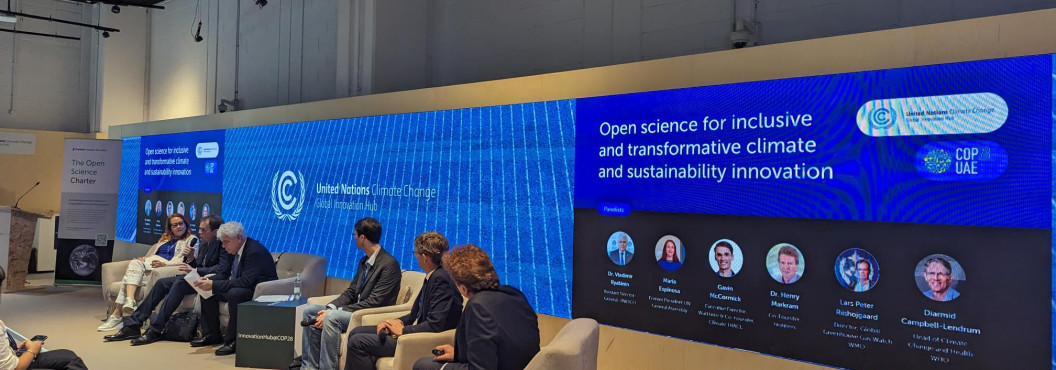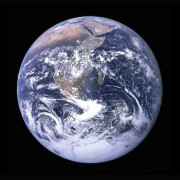- Science News
- Frontiers news
- The power of open science: Frontiers’ collaborative approach to addressing climate change
The power of open science: Frontiers’ collaborative approach to addressing climate change

Climate change poses an existential threat to society. Rising temperatures and shifting weather patterns are fueling environmental degradation, natural disasters, weather extremes, food and water insecurity, economic disruption, conflict, and terrorism. The World Economic Forum’s Global Risks Report 2024 identifies climate-related changes as some of the most severe risks over the next decade. And nearly two-thirds of the 1.2 million participants in the United Nations Development Programme’s 2021 People Climate Vote said that climate change is a ‘global emergency.’
Despite the severity of the situation, much of the knowledge needed to prevent the world from reaching an irreversible tipping point is not accessible. Out of the four million scientific articles published each year, 61% remains locked away behind subscription paywalls, including the majority of research related to climate change. Limiting access to this research hinders the speed at which policymakers, companies, and researchers can collaborate and innovate to bring about the solutions we so urgently need.
A means to an end
Science is not only a source of information, but also a catalyst for progress and transformation. Opening science to all citizens is a prerequisite for effective climate action, so that this research can be translated into new technology and deployed.
The COVID-19 pandemic demonstrated the power of open science to solve a global issue. In the US, the White House, along with a coalition of research organizations, launched the COVID-19 Open Research Dataset (CORD-19), mandating that all coronavirus-related research articles be made openly available. At that time, there were about 30,000 articles on this subject, most of which were locked behind paywalls. By the end of the pandemic, nearly 500,000 research articles had been produced and shared openly. The open sharing of this research, along with the extraordinary rallying of resources, delivered vaccines and treatments at a pace never experienced before in human history and saved more than 20 million lives in the first year of the pandemic alone.
Why hasn’t a similar approach been applied to the climate emergency?
Frontiers on a mission
Frontiers was founded in 2007 with the mission of making science open, so that scientists can collaborate better and innovate faster to deliver the solutions we need for healthy lives on a healthy planet. By promoting open science and its application, we want to spur the generation of more knowledge and accelerate the global transition to a low-carbon and resilient future in the face of climate change. A crucial element of this has been making research accessible and understandable to various audiences so that they can take better, more informed action.
In pursuit of this goal, we work with partners to build bridges between the research community and other parts of society such as global governance organizations, business, education, and policymakers. These partnerships allow us to amplify the benefits of open science. Our established partnerships include the United Nations Framework Convention on Climate Change (UNFCCC), the World Economic Forum (WEF), the Villars Institute, and the Geneva Science and Diplomacy Anticipator (GESDA).
With the support of our partners, we can further our mission.
Open science takes center stage: COP28

As part of our collaboration with the UNFCCC, Frontiers and the Frontiers Research Foundation were in attendance as world leaders convened at the 28th Conference of the Parties (COP) in Dubai to negotiate and agree on action to mitigate climate change, limit emissions, and halt global warming. As the world’s highest decision-making body on climate issues and one of the largest international meetings in the world, COP28 served as the ideal platform for Frontiers to highlight the need for open dissemination of transformative science, on the global scale.
Through a series of panels hosted by Frontiers, prominent experts and decision makers from policy, academia, and industry came together to discuss the pathways towards innovative and sustainable solutions. The complementary sessions explored the need for new, transformative scientific research and the need for radical collaboration guided by shared values to deliver on such solutions.
Massamba Thioye, executive at UNFCCC, reiterated a key takeaway from the panels, saying:
“Open science will be the push factor for innovation and the pull factor will be the concrete demand for climate and sustainability solution.”
To further support mandatory open access to all publicly funded scientific knowledge, the Frontiers Research Foundation officially launched the Open Science Charter at COP28. The charter urges governments, research institutions, and funders, as well as industry leaders and citizens of the world, to commit to making this research fully open by 2030.
COP28 is also where Frontiers and the United Nations Climate Change Global Innovation Hub (UGIH) announced their new partnership, making Frontiers the official Knowledge Partner of the UGIH’s Digital Platform. Together, they will develop the digital platform, with Frontiers making important research available and sharing the results of UGIH workshops through its journals and its Policy Labs initiative, which strengthens the connection between robust research and evidence-based policymaking. This collaboration was formalized through the signing of a Memorandum of Understanding (MoU) between Frontiers’ chief executive editor Frederick Fenter and the UNFCCC’s director of mitigation James Grabert during COP28.

Emerging technologies to tackle climate change: World Economic Forum
Technology is central to addressing climate change. It enables the speed and scale required to not only bolster efforts to reduce greenhouse gas emissions, but also build resilience to the impacts of a changing climate. Frontiers and the World Economic Forum have a long-standing collaboration and added a new dimension to this partnership by co-publishing the Top 10 Emerging Technologies Report of 2023, which identifies those technologies poised to have the biggest impact on society over the next three to five years. The report has helped business leaders, innovators, policymakers, and other professionals across industries and disciplines anticipate developing technology and understand the associated risks and opportunities.
2023 marked the first time the scope of the report was broadened to incorporate a qualitative assessment of how each technology will impact people, the planet, prosperity, industry, and equity. As the official Knowledge Partner of the report, Frontiers collaborated with the Forum to identify experts from its far-reaching research community to provide in-depth analysis of the technologies and how they connect to topics on the global agenda, like climate change.
Frontiers will resume its role as Knowledge Partner of the Top 10 Emerging Technologies report for 2024. The report will be released during the World Economic Forum’s 15th Annual Meeting of the Champions in the People’s Republic of China, taking place June 2024.
Systems thinking and celebrating scientific research: Villars Institute and the Frontiers Planet Prize
As part of Frontiers’ commitment to open science, emphasis is placed on making research available to diverse audiences through Frontiers’ family of outreach and engagement initiatives. By celebrating scientists’ groundbreaking work and cultivating the right mindset among young people, we will be able to empower the next generation to become ambitious systems leaders.
Launched by the Frontiers Research Foundation on Earth Day 2022, the Frontiers Planet Prize is a prestigious award that recognizes scientific breakthroughs with the greatest potential to stabilize our planet’s ecosystems. Every year three International Champions are awarded one million Swiss francs each to support their groundbreaking research. Through the prize’s network of strategic partnerships, the champions present their discoveries and engage with key planetary health stakeholders across academia, policy, and business, all of whom have the capability to shape policy and influence civil society. Included among these partners are the International Science Council (ISC), the Potsdam Institute of Climate Research Impact, Future Earth, and the Villars Institute, a non-profit foundation dedicated to accelerating the transition to net-zero emissions.
Frontiers collaborated with the Villars Institute for the 2023 Villars Symposium, a forum that brings thought leaders across policy, practice, and philanthropy together with engaged, solution-drive high school students from around the world who are committed to safeguarding our planetary health. Serving as a Knowledge Partner to the Villars Institute, the Frontiers Planet Prize hosted a workshop, highlighting the work of the Prize’s International Champions and examining how their research can be scaled up through a systems leadership approach.

Reflecting on the session, Jean-Claude Burgelman, director of the Frontiers Planet Prize, said:
“The future of our planet depends on leaders and decision makers who can think proactively and systematically to address the complex and interrelated challenges of planetary health. The partnership between the Frontiers Planet Prize and the Villars Institute signifies a joint effort to equip and empower the next generation with the knowledge, skills, and network needed to create change.”
Frontiers and the Villars Institute have extended their partnership into 2024, with the second edition of the Frontiers Planet Prize taking place during the upcoming Villars Symposium on 26 June 2024 in Villars-sur-Ollon, Switzerland.
Stimulating young minds for the future of the planet: Villars Institute and Frontiers for Young Minds
Protecting the planet will be an ongoing task, and while it’s imperative to act now, we must also engage with the actors and leaders of tomorrow. Frontiers explains important science to children through the Frontiers for Young Minds initiative, providing summaries of scientific discoveries that everyone can understand. As an award-winning, non-profit, open-access scientific journal for kids, Frontiers for Young Minds publishes articles written by leading researchers, and then peer reviewed by children aged 8-15. It covers subjects ranging from astronomy and biodiversity to Earth sciences and neuroscience.
A growing dedicated collection of articles on climate change allows young people to understand the implications of important new findings. This resource covers the basics of climate science, enabling children to be informed, confident, and passionate about protecting the planet.
'Intergenerational collaboration' is also the keyword in the role as a Knowledge Partner of the Villars Institute, for which Frontiers for Young Minds organized its own workshop during the 2023 Villars Symposium. The “How to Fix the Planet” workshop focused on empowering young people, including the Villars Fellows aged 13-19, to explore ways to live and prosper within the nine planetary boundaries that define the environmental limits in which humanity can safely operate.
An ongoing commitment
The climate emergency will only be mitigated through the implementation of effective scientific solutions. We urgently need to support all stages of the research-innovation cycle, and open science plays a critical, positive role by accelerating dissemination of knowledge, international collaboration, and public trust in science. We will continue to leverage our position as a publisher and steward of the scientific archive to reinforce strategic partnerships among researchers, funders, policymakers, and the public. Only by working together in a collective effort can we harness the full potential of open science and combat climate change.
As Frontiers’ chief executive officer Frederick Fenter summarized:
“To solve the climate emergency in time, we must all align to make science fully accessible to all. We all agree on this in principle, but we urgently need to make it happen in practice, now. Building coalitions of likeminded organizations with the vision and resources to move the needle, to drive awareness, and to show that there is hope through collaboration is a core part of our mission, and we welcome others to join us, because together we will make a difference.”
About Frontiers
Founded in 2007, Frontiers is the 3rd most-cited and 6th largest scientific publisher. We publish rigorously peer-reviewed, quality-certified research by the world's top experts. Scientists empower society and our mission is to accelerate scientific collaboration by making science open. We place the researcher at the center of everything we do and enable the research community to develop the solutions we need to live healthy lives on a healthy planet. Featuring custom-built technology, artificial intelligence, and rigorous quality standards, our research articles have been viewed more than 2.6 billion times, reflecting the power of research that is open for all.
About the Frontiers Research Foundation
The Frontiers Research Foundation is a not-for-profit organization based in Switzerland, which was founded by Kamila and Henry Markram, neuroscientists from the Swiss Federal Institute for Technology (EPFL). It raises funds to support programs that accelerate scientific solutions for healthy lives on a healthy planet.
About the Frontiers Planet Prize
The Frontiers Planet Prize is a global competition for scientists and research institutions to propose solutions to help the planet remain within the safe operating space of any one or more of the nine planetary boundaries. It was created by the Frontiers Research Foundation on Earth Day 2022 to mobilize the global scientific community, make it complete at the highest level of excellence, and contribute to the acceleration of concrete solutions to the challenges defined by the planetary boundaries. To date, it has drawn together hundreds of scientists, 20 national academies of science, 475 leading universities and research institutions to compete for three prizes of 1M Swiss francs each as adjudicated by a Jury of 100 leading sustainability scientists.








